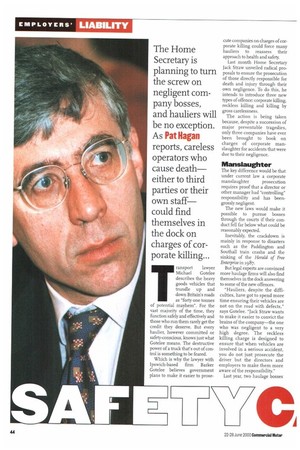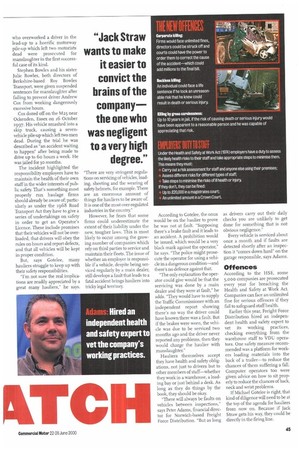The Home Secretary is planning to turn the screw on negligent com pany bosses, and hauliers will
Page 46

Page 47

If you've noticed an error in this article please click here to report it so we can fix it.
be no exception. As Pat Hagan reports, careless
operators who cause death either to third parties or their
own staff—
could find themselves in the dock on charges of cor porate killing...
Transport lawyer
Michael Gotelee describes the heavy goods vehicles that trundle up and down Britain's roads as "forty one tonnes of potential mayhem". For the vast majority of the time, they function safely and effectively and those who run them rarely get the credit they deserve. But every haulier, however committed or safety-conscious, knows just what Gotelee means. The destructive power of a truck that's out of control is something to be feared.
Which is why the lawyer with Ipswich-based firm Barker Gotelee believes government plans to make it easier to prose
cute companies on charges of corporate killing could force many hauliers to reassess their approach to health and safety.
Last month Home Secretary Jack Straw unveiled radical proposals to ensure the prosecution of those directly responsible for death and injury through their own negligence. To do this, he intends to introduce three new types of offence: corporate killing, reckless killing and killing by gross carelessness.
The action is being taken because, despite a succession of major preventable tragedies, only three companies have ever been brought to book on charges of corporate manslaughter for accidents that were due to their negligence.
Manslaughter
The key difference would be that under current law a corporate manslaughter prosecution requires proof that a director or other manager had "controlling" responsibility and has beengrossly negligent.
The new laws would make it possible to pursue bosses through the courts if their conduct fell far below what could be reasonably expected.
Inevitably, the crackdown is mainly in response to disasters such as the Paddington and Southall train crashs and the sinking of the Herald of Free Enterprise in 1987.
But legal experts are convinced more haulage firms will also find themselves in the dock answering to some of the new offences.
"Hauliers, despite the difficulties, have got to spend more time ensuring their vehicles are not on the road with defects," says Gotelee. "Jack Straw wants to make it easier to convict the brains of the company—the one who was negligent to a very high degree. The reckless killing charge is designed to ensure that when vehicles are involved in a serious accident, you do not just prosecute the driver but the directors and employers to make them more aware of the responsibility."
Last year, two haulage bosses who overworked a driver in the lead-up to a horrific motorway pile-up which left two motorists dead were prosecuted for manslaughter in the first successful case of its kind.
Stephen Bowles and his sister Julie Bowles, both directors of Berkshire-based Roy Bowles Transport, were given suspended sentences for manslaughter after failing to prevent driver Andrew Cox from working dangerously excessive hours.
Cox dozed off on the M25 near Ockenden, Essex on 16 October 1997. His vehicle smashed into a skip truck, causing a sevenvehicle pile-up which left two men dead. During the trial he was described as "an accident waiting to happen" after being made to drive up to 6o hours a week. He was jailed for 3o months.
The incident highlighted the responsibility employers have to maintain the health of their own staff in the wider interests of public safety. That's something most properly run haulage firms should already be aware of; particularly as under the 1968 Road Transport Act they have to give a series of undertakings on safety in order to get an Operator's Licence. These include promises that their vehicles will not be overloaded, that drivers will obey the rules on hours and report defects, and that all vehicles will be kept in proper condition.
But, says Gotelee, many hauliers struggle to keep up with their safety responsibilities.
"I'm not sure the real implications are readily appreciated by a great many hauliers," he says. "There are very stringent regulations on servicing of vehicles, loading, sheeting and the wearing of safety helmets, for example. There are an enormous amount of things for hauliers to be aware of. It is one of the most over-regulated industries in the country" However, he fears that some firms could underestimate the extent of their liability under the new, tougher laws. This is most likely to occur among the growing number of companies which rely on third parties to service and maintain their fleets. The issue of whether an employer is responsible if a vehicle, despite being serviced regularly by a main dealer, still develops a fault that leads to a fatal accident brings hauliers into tricky legal territory. According to Gotelee, the onus would be on the haulier to prove he was not at fault. "Supposing there's a brake fault and it leads to an accident. A prohibition would be issued, which would be a very black mark against the operator," he says. "The police might prosecute the operator for using a vehicle in a dangerous condition—and there's no defence against that.
"The only explanation the operator could give would be that the servicing was done by a main dealer and they were at fault," he adds. "They would have to supply the Traffic Commissioner with an independent report showing there's no way the driver could have known there was a fault. But if the brakes were worn, the vehicle was due to be serviced two months ago and the driver never reported any problems, then they would charge the haulier with manslaughter."
Hauliers themselves accept they have health and safety obligations, not just to drivers but to other members of staff—whether they work in a warehouse, a loading bay or just behind a desk. As long as they do things by the book, they should be okay.
"There will always be faults on vehicles between inspections," says Peter Adams, financial director for Norwich-based Freight Force Distribution. "But as long as drivers carry out their daily checks you are unlikely to get done for something that is not obvious negligence."
Every vehicle is serviced about once a month and if faults are detected shortly after an inspection it "comes down hard" on the garage responsible, says Adams.
Offences
According to the HS E, some 5,000 companies are prosecuted every year for breaching the Health and Safety at Work Act. Companies can face an unlimited fine for serious offences if they fail to safeguard staff health.
Earlier this year, Freight Force Distribution hired an independent health and safety expert to vet its working practices, checking everything from the warehouse staff to VDU operators. One safety measure recommended was a platform for workers loading materials into the back of a trailer—to reduce the chances of them suffering a fall. Computer operators too were given advice on how to sit properly to reduce the chances of back, neck and wrist problems.
If Michael Gotelee is right, that kind of diligence will need to be at the top of the agenda for hauliers from now on. Because if Jack Straw gets his way, they could be directly in the firing line.
















































































































